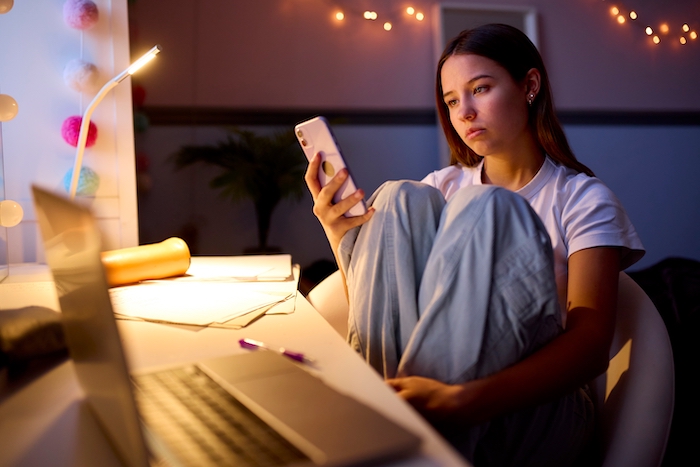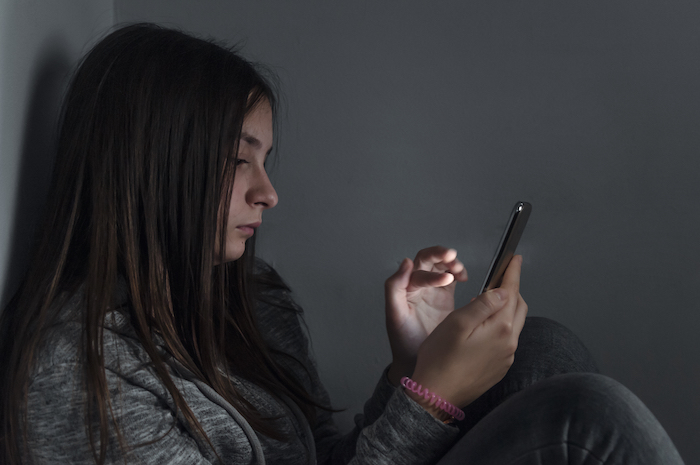HEALTH
Wellness
Is TikTok good or bad for teen mental health?

A year ago, Chloe R.'s TikTok homepage was filled with content clearly chosen for her by the algorithm: biology homework hacks, three-minute yoga tutorials and vegan Valentine's baking how-to's.
But after struggling with her mental health during the pandemic, the 16-year-old's FYP now features fewer tree poses and more tips on things like navigating toxic relationships and how to be less socially awkward.
And she's not the only one scrolling through mental health content on the social media platform. In a digital world where emotional well-being is a priority among teens, TikTok has become a seemingly safe space to share just about everything.
But taking in so much mental health content may have drawbacks.
As relatable as the content you watch may be, it can also be misleading—and even create more problems instead of solving them.
"Sometimes the content is relatable because it can apply to almost anyone," explains therapist Courtney Conley. "If you're not feeling great to begin with, it can perpetuate a feeling that something's wrong with you—even when you're just experiencing normal moodines or temporary sadness."
Related: Don't believe these myths about mental health. Here are the facts you need to know
So before you open the app and start scrolling on a tough day, be sure you know these truths.

The truth: TikTok can make you feel less alone in your struggles.
"Watching influencers open up has normalized the anxiety I go through," shares Siena J., 15. "The videos and infographics I saw on social media helped me figure out how to share what was going on inside my head with my parents and teachers."
Plus, reading the comments and being able to engage with thousands of people experiencing the same stuff you are can also make you feel a lot less isolated, teens say.
According to the experts, this is a good thing: "If the TikTok posts you're consuming are alleviating feelings of isolation and helping you engage in more internal self-reflection, that's a win," says clinical psychologist Dr. Lauren Kerwin.
The truth: TikTok isn't a place to seek a diagnosis.
It's one thing to go to TikTok as a way to identify with others—but interacting with strangers won't ultimately fix your feelings. And with so much content on your FYP, it's easy to a) fall into the self-diagnosis trap and b) take a random person's guidance as the holy grail. (Plus, remember how algorithms work: The more videos about depression you watch, the more you'll start seeing.)
"It's dangeous to over-identify with a diagnosis, especially one that hasn't been given to you from a mental health professional," Conley says. "Removing stigma is great, but you need to be able to then navigate and work through what you're actually experiencing."
Related: Feeling kinda down lately? Here's what to do
Say you discover an influencer spilling about social anxiety. And her issues sound a lot like yours. As familiar as her anecdotes may seem, don't label your feelings just yet. Save the videos to bring to a professional—like a school counselor, therapist or doctor.
The truth: TikTok isn't therapy.
While it's amazing that you can gain access to a global network (including experts) on your phone, TikTok is not a replacement for therapy IRL. "There's no real give-and-take relationship on TikTok," Dr. Kerwin explains about the patient/professional dynamic, which is based on the individual client and ethical standars, not a one-size-fits-all approach.
In other words, what works for one person you follow may not be right for you. So if you're looking to *truly* connect, talk to a trusted adult about seeing a professional.
The truth: TikTok "experts" aren't all, um, experts.
On social media, tried-and-true experts post content alongside people who are, well, anything but. "Not all information is created equal," says Conley. "You have to be really careful to filter through what makes sense."
Related: 5 mental health social media accounts you can actually trust
If you wind up on a TikTok from a licensed mental health professional, you can probably take the information they are sharing seriously. That said, still Google their credentials to be sure you can trust what they're saying.
The truth: Social media is supposed to be fun.
It's key to remember that TikTok is, for the most part, meant to be a brain break—not something that causes you extra stress or worry.
So if you find yourself getting too deep in the mental health space (or if you're triggered by the content being sent your way), try to realign your algorithm to avoid getting dragged down. (Or, even better, take a break from the app for a few weeks...or months.)
Related: Do you need a social media break?
"You should see TikTok as what it is: entertaiment," advises Dr. Kerwin. "No algorithm truly knows your life, so balance it with actual relationshps in the real world." After all, these years are about discovering who you are, what you like and what you genuinely stand for—and you can't do that while scrolling through videos on a screen.
Need mental health help right now? Reach out immediately to a toll-free confidential hotline like 1-800-273-8255 or 1-800-999-9999 or text HOME to 741741.
More inspiration for brighter days...
🌟 Enter your nature girl era with this mindfulness practice
🌟 Vibe check! How to embrace your inner positive energy
🌟 How to stay happy when you have a busy schedule
POSTED IN Wellness, HEALTH, anxiety, dealing with depression, dealing with anxiety

 become a contributor
become a contributor


















